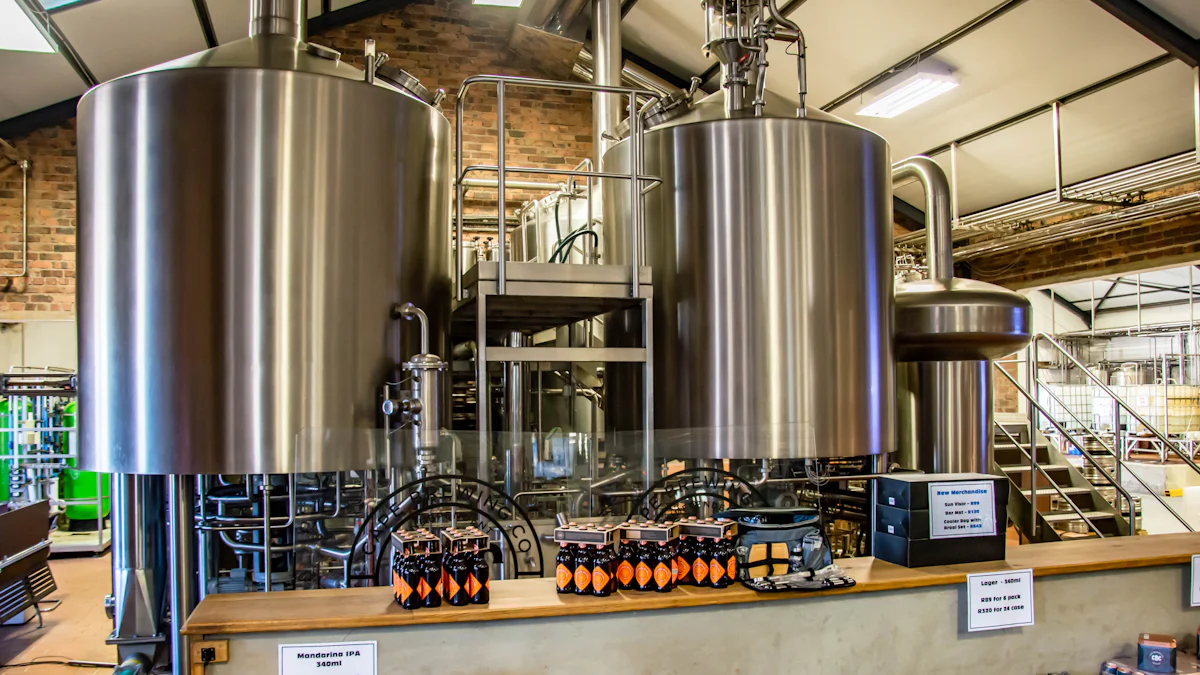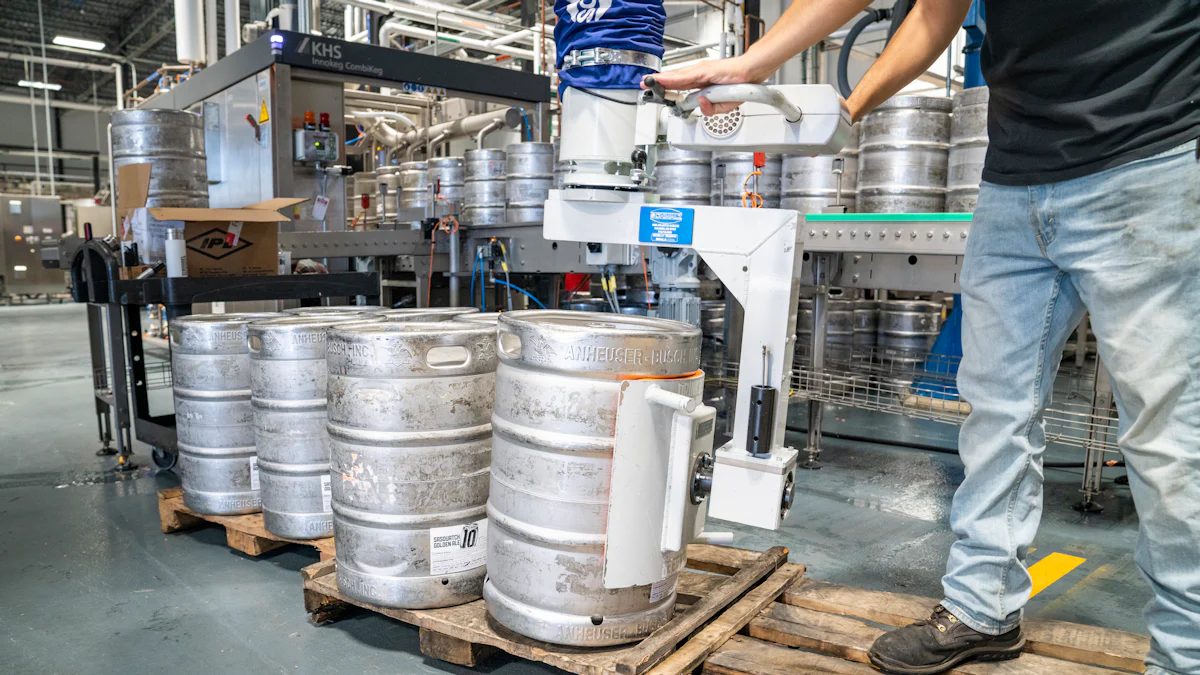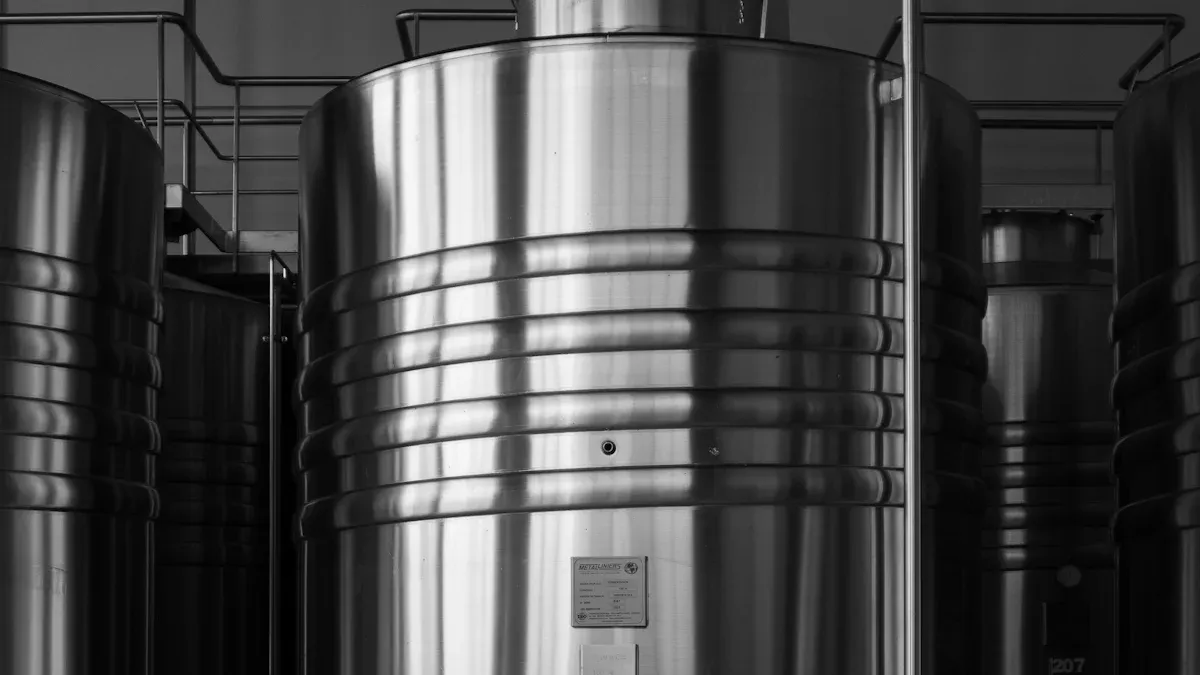
Selecting the right commercial cider fermenter plays a vital role in the success of your cider-making process. The fermenter directly impacts the flavor, aroma, and consistency of your cider. Whether you produce small batch cider or large-scale commercial cider, the right equipment ensures smooth fermentation and enhances the quality of your hard cider. A well-chosen fermenter also boosts efficiency, allowing you to scale production as your business grows. From homemade cider to various types of cider made from fresh apples, the right equipment supports every step of the process. Investing in the right fermenter saves time, reduces waste, and ensures long-term profitability.
Key Factors to Consider for a Commercial Cider Fermenter
Size and Capacity
Choosing the right size and capacity for your fermenter is essential for meeting your production goals. The fermenter should align with your business scale and cider-making volume. For small-scale operations like microbreweries, fermenters with a capacity of 5-10 barrels are ideal. Larger craft cider producers often require fermenters that hold between 20 and 200 barrels or more.
| Business Scale | Fermenter Capacity | |———————–|————————–| | Microbreweries | 5-10 barrels | | Larger Craft Breweries | 20-200 barrels or more |
Selecting the correct capacity ensures you can meet demand without overextending resources. It also allows you to scale production efficiently as your business grows.
Material and Durability
The material of your fermenter directly impacts its longevity and the quality of your cider. Stainless steel is the most popular choice for commercial cider fermenters due to its durability and resistance to corrosion. It maintains the integrity of the cider by preventing contamination and ensuring a clean fermentation environment. Stainless steel fermenters are also easier to clean and maintain, which reduces downtime and enhances operational efficiency.
Durable materials like stainless steel withstand the rigors of daily use, making them a cost-effective investment for long-term cider production. By choosing a high-quality fermenter, you minimize the risk of equipment failure and ensure consistent cider quality.
Temperature Control Features
Temperature control is a critical feature for any commercial cider fermenter. Proper temperature regulation allows you to manage fermentation dynamics effectively. This ensures the development of desired flavors while minimizing off-flavors. Maintaining an optimal temperature supports yeast health, leading to efficient sugar consumption and higher alcohol content.
- Temperature control influences the production of esters and flavor compounds, helping you create a tailored flavor profile.
- Different yeast strains perform best at specific temperatures, which impacts the complexity and character of your cider.
By investing in a fermenter with advanced temperature control features, you can enhance the quality and consistency of your cider-making process.
Ease of Cleaning and Maintenance
Keeping your fermenter clean is essential for producing high-quality cider. A fermenter that is easy to clean saves time and ensures a sanitary environment for fermentation. Residue from previous batches can lead to contamination, affecting the flavor and consistency of your cider. Stainless steel fermenters are particularly advantageous in this regard. Their smooth surfaces prevent residue buildup, making cleaning more efficient.
Look for fermenters with features like removable parts or wide openings. These designs allow you to access every corner of the tank, ensuring thorough cleaning. Some fermenters also include built-in cleaning systems, such as spray balls, which distribute cleaning solutions evenly across the interior. These systems reduce manual labor and improve cleaning efficiency.
Regular maintenance is equally important. A well-maintained fermenter operates more reliably and lasts longer. By choosing a fermenter with user-friendly maintenance features, you can minimize downtime and focus on growing your cider business.
Automation and Technology
Modern cider fermenters often include advanced automation and technology features. These innovations streamline the fermentation process and improve production efficiency. Automated systems monitor critical parameters like temperature, pressure, and fermentation stages in real time. This ensures consistent results and reduces the risk of human error.
- Real-time monitoring helps you maintain optimal fermentation conditions, enhancing cider quality.
- Automated systems optimize resource use, minimizing waste and lowering production costs.
- High-tech packaging lines handle tasks with speed and precision, meeting market demands effectively.
- Continuous ingredient monitoring prevents shortages and allows proactive adjustments.
These technologies also improve compliance with industry regulations. Real-time traceability identifies trends and highlights areas for improvement, ensuring consistent quality control. Investing in a fermenter with these features can significantly enhance your cider production process.
Cost and Budget Considerations
Balancing quality and cost is crucial when selecting a commercial cider fermenter. While high-end fermenters may seem expensive initially, they often provide better long-term value. Durable materials like stainless steel reduce repair and replacement costs. Advanced features like temperature control and automation improve efficiency, saving time and resources.
Consider your production scale and future growth when setting your budget. A fermenter that meets your current needs but allows for scalability can save you from costly upgrades later. Compare options from reputable suppliers to find a fermenter that offers the best combination of quality and affordability.
Remember, a well-chosen fermenter is an investment in your business’s success. By prioritizing quality and functionality, you can achieve consistent results and maximize profitability.
Benefits of Choosing the Right Fermenter for Apple Cider Fermentation
Improved Cider Quality
The right fermenter plays a crucial role in producing high-quality cider. It provides a controlled environment for fermentation, ensuring consistent results. Stainless steel fermenters, for example, prevent contamination and preserve the natural flavors of apples. Features like temperature control allow you to fine-tune the fermentation process, enhancing the aroma and taste of your cider.
Using a commercial cider fermenter designed for apple cider fermentation helps you achieve the desired balance of sweetness, acidity, and alcohol content. This precision creates a product that stands out in the market. Whether you produce hard cider or homemade cider, the right equipment ensures your cider meets the highest standards.
Enhanced Efficiency
A well-designed fermenter streamlines your cider-making process. Advanced features like automated systems monitor fermentation parameters, reducing the need for manual oversight. This saves time and minimizes errors. Built-in cleaning systems, such as spray balls, simplify maintenance and reduce downtime.
Efficient fermentation equipment also optimizes resource use. By maintaining consistent conditions, you can reduce waste and improve yield. This efficiency allows you to focus on other aspects of your business, such as marketing or distribution, while ensuring your cider-making process runs smoothly.
Scalability for Business Growth
Choosing the right fermenter supports your business as it grows. A fermenter with sufficient capacity allows you to meet increasing demand without compromising quality. Modular designs or custom options enable you to expand production when needed.
Investing in commercial fermentation equipment ensures you can scale your operations efficiently. As your business grows from small batches to larger volumes, the right fermenter adapts to your needs. This scalability positions your brand for long-term success in the competitive cider market.
Cost Savings Over Time
Investing in the right fermenter for your cider production can lead to significant cost savings over time. While the initial purchase may seem like a large expense, the long-term benefits outweigh the upfront cost. A high-quality commercial cider fermenter reduces maintenance expenses and minimizes the need for frequent repairs or replacements. Durable materials, such as stainless steel, ensure your equipment lasts for years, providing a reliable foundation for your business.
Efficient fermenters also help you save on operational costs. Advanced features, like temperature control and automation, optimize the fermentation process. These features reduce energy consumption by maintaining precise conditions without constant manual adjustments. Automated systems also minimize labor costs by handling tasks like monitoring and cleaning, freeing up your time for other business priorities.
Waste reduction is another area where the right fermenter saves money. Consistent fermentation conditions prevent spoilage and ensure higher yields from your raw materials. This efficiency means you can produce more cider with the same amount of apples, maximizing your return on investment. Additionally, fermenters with built-in cleaning systems use less water and cleaning agents, lowering utility and supply costs.
Scalability further enhances cost savings. Choosing a fermenter that accommodates your current production needs while allowing for future growth eliminates the need for costly upgrades. As your business expands, your fermenter adapts, ensuring you can meet demand without additional investments.
By selecting the right fermenter, you create a cost-effective cider production process. This decision not only improves your bottom line but also positions your business for long-term success in the competitive cider market.
Types of Commercial Cider Fermenters and Their Applications

Conical Fermenters
Conical fermenters are a popular choice for cider making due to their unique design and functionality. The conical bottom allows you to easily separate yeast and sediment from the cider during fermentation. This design simplifies the process of collecting samples or harvesting yeast for reuse. You can also reduce the risk of contamination since the conical shape minimizes contact between the cider and unwanted particles.
These fermenters are typically made of stainless steel, which ensures durability and easy cleaning. They are ideal for small to medium-scale cider production, offering flexibility for different fermentation styles. While conical fermenters may cost more than flat-bottom fermenters, their efficiency and ease of use make them a worthwhile investment for your business.
Flat-Bottom Fermenters
Flat-bottom fermenters are a more traditional option for cider production. These fermenters are often more affordable, making them a good choice if you are just starting out or working with a limited budget. However, they require additional steps during the fermentation process. For example, you may need to transfer the cider to a separate conditioning tank, which increases labor and time.
Flat-bottom fermenters are less efficient at separating yeast and sediment compared to conical designs. This can lead to a higher risk of contamination if not handled carefully. Despite these limitations, flat-bottom fermenters remain a viable option for small-scale operations or home cider makers.
Cylindroconical Fermenters
Cylindroconical fermenters combine the best features of conical and flat-bottom designs. These fermenters allow you to perform both primary fermentation and conditioning in the same tank, streamlining the cider-making process. The conical bottom aids in yeast recovery and reduces contamination risks, while the cylindrical body provides ample space for fermentation.
These fermenters are the industry standard for large-scale cider production. They are versatile enough to handle different fermentation styles, whether you are producing ales, lagers, or hard cider. Made from stainless steel, cylindroconical fermenters are durable, easy to clean, and highly efficient. Their advanced design makes them a top choice for professional cider makers aiming to optimize their production process.
Custom Fermenters
Custom fermenters offer a unique solution tailored to your specific cider production needs. Unlike standard fermenters, these tanks are designed to match your exact requirements, ensuring optimal performance and efficiency. Whether you need a fermenter with a specific capacity, shape, or advanced features, custom options provide the flexibility to create equipment that aligns perfectly with your business goals.
Benefits of Custom Fermenters
- Tailored Capacity: Custom fermenters allow you to choose the exact size that fits your production scale. Whether you produce small batches or large volumes, you can avoid underutilized space or capacity shortages.
- Specialized Features: You can add features like advanced temperature control systems, built-in cleaning mechanisms, or unique valve configurations. These features enhance efficiency and simplify your cider-making process.
- Optimized Design: Custom fermenters can be designed to fit your facility layout. This ensures you maximize available space and streamline your workflow.
Tip: If your cider production involves unique processes or ingredients, a custom fermenter can help you maintain consistency and quality.
When Should You Consider a Custom Fermenter?
You should consider a custom fermenter if your production needs exceed the capabilities of standard models. For example, if you require a fermenter with a non-standard capacity or need specific automation features, a custom solution is ideal. Businesses planning to scale production or experiment with innovative cider recipes also benefit from custom designs.
Custom fermenters may involve a higher initial investment. However, the long-term benefits, including improved efficiency and scalability, make them a worthwhile choice. By investing in a fermenter tailored to your needs, you can elevate your cider production and position your brand for success.
How to Choose the Best Fermenter for Hard Cider Production
Assessing Your Business Needs
Start by evaluating your production goals and facility requirements. Consider the volume of hard cider you plan to produce. Small-scale operations may need fermenters with a capacity of 5-10 barrels, while larger commercial producers often require tanks that hold 20 barrels or more. Think about your available space. Ensure the fermenter fits your facility without disrupting workflow.
Identify the features you need for your cider-making process. For example, if you want precise control over fermentation, look for fermenters with advanced temperature control systems. If you plan to scale production in the future, choose equipment that supports modular expansion. By understanding your business needs, you can select a fermenter that aligns with your goals and ensures efficient fermentation.
Researching Suppliers and Brands
Choosing the right supplier is as important as selecting the fermenter itself. Reputable suppliers offer high-quality equipment and reliable customer support. Here’s a comparison of some top suppliers:
| Supplier | Price Range | Notable Features | |—————————|———————-|———————————————————————————| | BrewTech | $10,000 – $50,000 | Customizable fermentation tanks and bioreactors for breweries. | | SS BrewTech | $5,000 – $20,000 | Known for conical fermenters, ideal for small to mid-scale operations. | | Premier Stainless Systems | $15,000 – $70,000 | Integrated fermentation and packaging solutions for large-scale production. | | Custom Metalcraft | $25,000 – $100,000+ | Specializes in custom stainless steel tanks for food and beverage industries. | | Newlands Systems | $20,000 – $80,000 | Offers advanced automation features for large-scale cider-making operations. |
Research each supplier’s reputation and customer reviews. Look for certifications that ensure safety and quality standards. A reliable supplier not only provides durable fermenters but also supports your business with technical expertise.
Balancing Quality and Budget
Balancing quality and budget is crucial when selecting a commercial cider fermenter. High-quality fermenters, often made from stainless steel, may cost more initially but save money in the long run. Durable materials reduce maintenance costs and ensure consistent fermentation. Advanced features like temperature control and automation improve efficiency, lowering operational expenses.
Set a realistic budget based on your production scale. Avoid choosing the cheapest option if it compromises quality. Instead, focus on finding a fermenter that meets your needs without exceeding your financial limits. Compare options from reputable suppliers to identify the best value. Investing in a high-quality fermenter ensures reliable performance and supports your business growth.
Testing and Trial Runs
Testing and trial runs are essential steps when choosing the best commercial cider fermenter for your business. These steps allow you to evaluate the equipment’s performance and ensure it meets your production needs. By conducting thorough tests, you can identify potential issues and make informed decisions before committing to a purchase.
Start by requesting a trial period or demonstration from the supplier. Many reputable manufacturers offer this option to help you assess their fermenters. During the trial, monitor key aspects such as temperature control, ease of use, and cleaning efficiency. Pay attention to how the fermenter handles your specific cider recipe. This ensures the equipment can produce consistent results that align with your quality standards.
Tip: Use a small batch of cider for the trial run. This minimizes waste while allowing you to test the fermenter’s capabilities.
Evaluate the fermenter’s compatibility with your existing setup. Check if it integrates smoothly with your other equipment, such as pumps or cooling systems. If you plan to scale production, ensure the fermenter supports future expansion.
Involve your team in the testing process. Their feedback on usability and maintenance requirements can provide valuable insights. Ask them to assess features like valve placement, access points, and automation systems.
Document the results of your trial runs. Create a checklist to compare different fermenters based on performance, efficiency, and cost-effectiveness. This organized approach helps you identify the best option for your business.
Testing and trial runs reduce the risk of costly mistakes. They give you confidence in your investment and ensure the fermenter aligns with your production goals. By taking the time to test, you set your cider business up for long-term success.
Common Mistakes to Avoid When Selecting a Cider Fermenter
Overlooking Long-Term Needs
When choosing a fermenter, focusing only on your current production can limit your growth. You need to think about how your cider-making business might expand in the future. A fermenter that works for small batches today may not handle larger volumes later. If you plan to scale up, select a fermenter with enough capacity to meet future demand.
Consider the durability of the equipment. A high-quality commercial cider fermenter made from stainless steel lasts longer and supports consistent fermentation. Investing in a durable fermenter now saves you from frequent replacements. Also, think about features like modular designs or automation. These options make it easier to upgrade your equipment as your business grows.
Choosing Based on Price Alone
Price is important, but it should not be the only factor in your decision. A cheaper fermenter might seem like a good deal, but it often comes with hidden costs. Low-quality materials can lead to contamination during fermentation, affecting the taste of your cider. Repairs and replacements for poorly made equipment can quickly add up.
Instead, focus on value. Look for a fermenter that balances cost with quality. Stainless steel fermenters, for example, offer excellent durability and are easy to clean. Advanced features like temperature control improve the fermentation process and reduce waste. Spending more upfront on a reliable fermenter ensures better results and long-term savings.
Neglecting Maintenance Requirements
Ignoring maintenance needs can lead to costly downtime. A fermenter that is difficult to clean or repair slows down your cider-making process. Residue from apples or yeast buildup can cause contamination, ruining your hard cider.
Choose a fermenter with user-friendly maintenance features. Look for wide openings or built-in cleaning systems like spray balls. These features make cleaning faster and more thorough. Regular maintenance also extends the life of your fermenter. By keeping your equipment in top condition, you ensure smooth fermentation and consistent cider quality.
Tip: Create a maintenance schedule to stay on top of cleaning and inspections. This helps you avoid unexpected issues and keeps your production running efficiently.
How to Maintain Your Commercial Cider Fermenter
Regular Cleaning Practices
Keeping your fermenter clean is essential for producing high-quality cider. Start by cleaning the fermenter immediately after each use to prevent residue buildup. Use a non-abrasive cleaning solution designed for stainless steel to avoid damaging the surface. Rinse thoroughly with warm water to remove any cleaning agents.
For stubborn residue, use a soft brush or sponge to scrub the interior. Avoid harsh chemicals or abrasive tools, as they can scratch the fermenter and create areas where bacteria can grow. Built-in cleaning systems, like spray balls, simplify this process by distributing cleaning solutions evenly.
Sanitizing the fermenter before each use is equally important. Use a food-grade sanitizer to eliminate any remaining microorganisms. Pay special attention to valves, seals, and other hard-to-reach areas. A clean fermenter ensures a sterile environment, reducing the risk of contamination during fermentation.
Preventative Maintenance
Preventative maintenance keeps your fermenter in optimal condition and extends its lifespan. Regularly inspect the fermenter for signs of wear, such as loose fittings or damaged seals. Replace worn parts promptly to avoid leaks or inefficiencies.
Maintain a stable fermentation temperature between 60-72°F (15-22°C) to support yeast activity. Use a thermometer strip or place the fermenter in a cool, stable environment to prevent temperature fluctuations. Consistent temperatures improve fermentation quality and reduce stress on the yeast.
Racking is another essential practice. Transfer cider from the primary fermenter to a secondary container using a sanitized siphon. This process separates the cider from sediment, preventing off-flavors and enhancing clarity. Allow the cider to mature for 2-4 weeks in the secondary fermenter to refine its flavor profile.
Troubleshooting Common Issues
Even with proper maintenance, issues can arise during fermentation. Addressing them quickly ensures minimal disruption to your cider-making process.
- Stuck Fermentation: If fermentation stops prematurely, raise the temperature slightly or add yeast nutrients. Pitching fresh yeast can also restart the process.
- Off-Flavors: Sanitize all equipment thoroughly and maintain stable temperatures. Use high-quality ingredients to avoid undesirable flavors.
- Managing Acidity: If the cider tastes too acidic, blend it with sweeter apple varieties or adjust the flavor post-fermentation.
By staying proactive and addressing problems early, you can maintain consistent cider quality and keep your fermenter running smoothly.
Why Stainless Steel Fermenters Are Ideal for Apple Cider Fermentation

Durability and Longevity
Stainless steel fermenters stand out for their exceptional durability, making them a reliable choice for cider making. These fermenters resist corrosion caused by alcohol and the natural acidity of apples during fermentation. This resistance ensures a longer lifespan compared to other materials. Their mechanical strength allows them to handle pressure changes without leaks or damage, even during the most demanding fermentation processes.
The smooth, non-porous surface of stainless steel enhances hygiene by preventing residue buildup. This feature reduces contamination risks and ensures consistent production of high-quality cider. Additionally, stainless steel fermenters maintain ideal fermentation temperatures, which is crucial for yeast activity and the overall process. Their sealing properties also prevent oxygen from entering, protecting the cider from oxidation and preserving its flavor.
Impact on Cider Quality
Using stainless steel fermenters directly improves the quality of your hard cider. These fermenters provide strong antioxidant properties, reducing oxidation and preserving the natural flavors of apples. Their smooth surface minimizes contamination risks, ensuring a clean environment for fermentation.
Temperature stability is another key advantage. Stainless steel fermenters maintain consistent conditions, which are essential for developing the desired flavor profile in your cider. This stability supports yeast health, leading to efficient sugar conversion and a balanced final product. By using stainless steel equipment, you can produce cider with enhanced aroma, taste, and clarity, helping your brand stand out in the competitive market.
Ease of Cleaning and Maintenance
Cleaning and maintaining your fermenter is critical for producing high-quality cider. Stainless steel fermenters simplify this process with their smooth, non-porous surfaces. These surfaces prevent residue buildup, making cleaning faster and more effective. Built-in cleaning systems, such as spray balls, distribute cleaning solutions evenly, saving time and effort.
Regular maintenance becomes easier with stainless steel fermenters. Their durability reduces the need for frequent repairs or replacements. You can focus on refining your cider-making process instead of worrying about equipment failures. By choosing stainless steel, you ensure a sanitary and efficient fermentation environment, which directly contributes to consistent results and long-term success.
The Role of Chenma in Providing High-Quality Fermentation Equipment
Expertise in Stainless Steel Tank Manufacturing
Chenma brings unmatched expertise to stainless steel tank manufacturing, specifically designed to enhance cider production. The tanks feature insulation or jacketed designs that maintain optimal fermentation temperatures, ensuring consistent results. Smooth interior surfaces simplify cleaning and reduce contamination risks, creating a sanitary environment for cider-making. Conical bottoms allow for easy removal of sediment, improving the clarity and flavor of your cider. Stainless steel construction prevents unwanted flavors from interfering with the natural apple characteristics, preserving the authenticity of your product.
Chenma’s tanks also support the aging process by providing stable conditions that promote flavor integration and development. Advanced features, such as PT100 temperature probes, enable precise monitoring of fermentation conditions, giving you greater control over the process. Operating from a 20,000 m² facility equipped with state-of-the-art machinery, Chenma employs over 200 professionals dedicated to innovation and quality. The company’s engineering design team holds national design and construction grade II qualification certification, reflecting its commitment to safety and excellence.
Custom Solutions for Cider Producers
Chenma understands that every cider producer has unique needs. That’s why the company offers custom stainless steel tanks tailored to your specific requirements. These tanks provide durability, sanitation, and precise temperature control, ensuring optimal fermentation. Customization options include multi-zone glycol jacketing, bottom cleanout doors, and racking ports, all designed to streamline your cider-making process.
Variable Capacity Tanks allow you to adjust the volume, making them ideal for producing different batch sizes. Off-center or centric conical tops improve yeast management, ensuring efficient fermentation. Additional features, such as PT100 temperature probes and bimetallic thermometers, provide accurate monitoring, helping you maintain consistent quality. With Chenma’s custom solutions, you can create a fermenter that perfectly aligns with your production goals.
Certifications and Quality Standards
Chenma prioritizes quality and safety in every piece of equipment it manufactures. The company has earned ISO9001-2005 quality system certification, ISO14001-2015 environmental management system certification, and OHSAS18001-2007 occupational health management system certification. These certifications demonstrate Chenma’s dedication to producing reliable and environmentally responsible fermentation equipment.
Chenma also meets EU CE certification standards, ensuring its products comply with European safety and quality regulations. These rigorous standards give you confidence in the durability and performance of your fermenter. By choosing Chenma, you invest in equipment that supports your business with consistent results and long-term reliability.
Selecting the right fermenter is essential for ensuring the quality of your cider and the success of your business. A well-chosen fermenter provides precise temperature control, simplifies cleaning, and prevents oxygen exposure, all of which are critical for producing high-quality cider. The table below highlights key factors to consider:
| Factor | Description | |———————–|——————————————————————————————————| | Temperature Control | Essential for preventing off-flavors and ensuring optimal yeast activity. Look for features like glycol jackets or cooling coils. | | Ease of Cleaning | Important for sanitation; choose fermenters with smooth interiors and clean-in-place systems. | | Oxygen Management | Prevents unwanted oxygen from entering the fermenter, which can lead to off-flavors. | | Automation and Monitoring | Beneficial for scaling production; allows real-time tracking of fermentation conditions. |
Take the time to evaluate your production needs, research suppliers, and test equipment before making a decision. This approach ensures you select a fermenter that aligns with your goals and supports efficient cider making.
Chenma offers exceptional solutions tailored to cider producers. Their fermenters provide optimal fermentation conditions, simplify cleaning, and support both primary and secondary fermentation. The aging process in Chenma fermenters enhances cider character over time. With certifications like ISO9001-2005 and ISO14001-2015, Chenma ensures quality and reliability in every product. By choosing Chenma, you invest in equipment that helps your business thrive.
FAQ
What is the best material for a commercial cider fermenter?
Stainless steel is the best material. It resists corrosion, maintains cider quality, and ensures durability. Its smooth surface simplifies cleaning and reduces contamination risks, making it ideal for consistent fermentation.
How do I determine the right fermenter size for my business?
Evaluate your production goals. Small-scale operations may need 5-10 barrel fermenters, while larger producers often require 20 barrels or more. Consider future growth to avoid frequent upgrades.
Can I use one fermenter for both fermentation and aging?
Yes, many fermenters, like cylindroconical designs, support both processes. These fermenters streamline production by allowing primary fermentation and aging in the same tank, saving time and space.
How often should I clean my fermenter?
Clean your fermenter after every use. Immediate cleaning prevents residue buildup and contamination. Use food-grade sanitizers and built-in cleaning systems, like spray balls, for thorough and efficient cleaning.
Are custom fermenters worth the investment?
Custom fermenters are worth it if you have unique production needs. They offer tailored features, such as specific capacities or advanced temperature controls, ensuring optimal performance and scalability.



